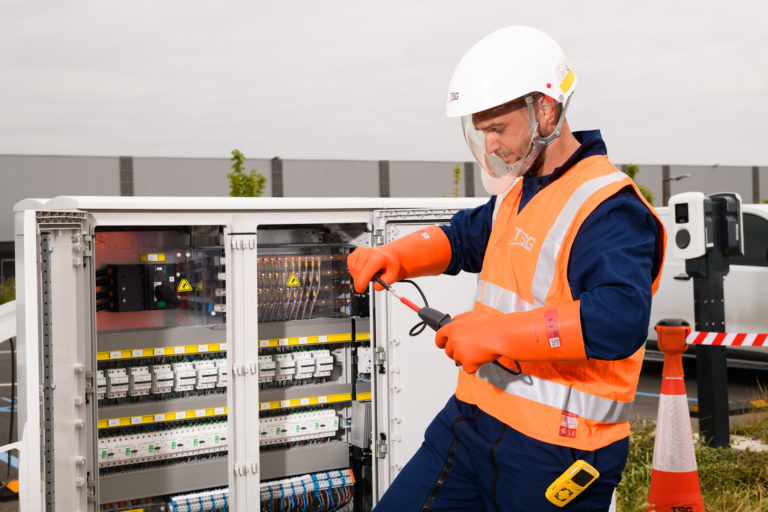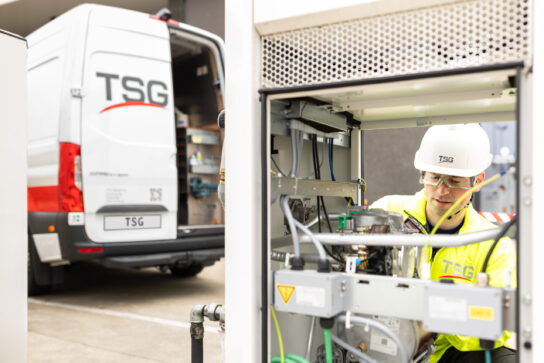Service and Maintenance Programme
The recent proliferation of electric vehicles (EVs) on UK roads has triggered a significant expansion of the charging infrastructure. Operators need to ensure charge points are regularly checked and maintained to contribute to a safer, more reliable and efficient charging network.
With the increase in EV sales, the demand for reliable and efficient EV charging stations has soared. The backbone of this growing infrastructure is the maintenance and upkeep of these sites, which is important for ensuring smooth operation, customer satisfaction and the widespread adoption of electric vehicles.
Businesses relying on electric vehicles require dependable EV charging stations to keep their cars/vans charged and ready to go. Likewise, operators of public charging hubs have to fulfil the needs of the motorist to encourage repeat visits and safeguard the site’s reputation.
EV charging facilities are costly investments but appropriate EV charger maintenance will extend their lifespan and reduce the return on investment (ROI) risks for the operator.

Simple Checks of EV Charging Sites
There are some simple steps that site owners can perform, without the need for third-party intervention, such as regular cleaning of the charging units to prevent the accumulation of dust, grime and other contaminants that could affect performance.
Site staff should also check the chargers for wear and tear, damage or vandalism, making sure that all of the bays are easily accessible and the site is free from obstructions.
Furthermore, staff should conduct regular inspections and perform verification tests on the chargers’ payment terminals, to ensure they are fully operational.
All other checks and tests should be carried out by a qualified EV charge technician from a reputable company, preferably on a planned preventative maintenance (PPM) basis.

The Importance of Planned Preventative Maintenance (PPM)
A successful Planned Preventive Maintenance (PPM) programme comprises regular checks and servicing of the charging equipment, providing early identification of potential issues, ensuring consistent operation and minimising downtime.
As an example, periodic testing of key components such as transformers, circuit breakers and cooling systems to ensure they are operating within optimal parameters. Furthermore, checking the efficient distribution of electrical loads across the chargers within the station will help to detect any irregularities in charging times, which could indicate issues such as low voltage or battery malfunctions.

PPM is a proactive approach to asset management where equipment inspections are scheduled ahead of time, while the vehicle chargers are still fully operational. It establishes a stable routine for site staff and reduces the worry of unexpected disruption to the business.
PPM works in direct contrast to reactive maintenance where electric vehicle chargers are checked and repaired following a breakdown or failure.
Benefits of Charge Station Planned Preventative Maintenance (PPM)
Dependability: A breakdown can be an incredibly inconvenient and costly problem, and in extreme cases can damage the site’s reputation. Adopting a PPM strategy ensures EV chargers operate reliably, preventing breakdowns and optimising uptime. It is a proven method for charge stations to remain fully operational while reducing replacement costs and preventing premature wear and tear.
Efficiency: PPM minimises the risk of unexpected failures that can lead to charger downtime and loss of business. Identifying and mitigating deterioration of the charging units ensures that they will continue to function efficiently, reducing the need for unplanned repairs and contributing to a consistent recharging process.
Protection: Well-maintained EV charge equipment reduces safety risks for both staff and customers. PPM lowers the risk of accidents through regular inspections of the power supply, connectors, charging cables and charging enclosure, and can help identify defects that could present a danger to health.
Longevity: PPM is the best approach for a business to extend the lifespan of its EV chargers while reducing replacement costs and avoiding untimely degradation. It can identify specific performance indicators that allow site owners to assess the availability, reliability, functionality and maintenance costs of the chargers. Recognising these potential issues before the equipment fails helps operators budget repair costs and replacements accordingly.
Goodwill: Customer satisfaction is pivotal to the success of any energy retailer. Customers expect a seamless recharging process, clean facilities and reliable service. If the site fails to deliver on those expectations, customer loyalty will be damaged. Regular maintenance ensures that chargers work smoothly, connectors are clean and facilities are tidy. A well-presented operation enhances the customer experience and helps the business to remain competitive.
Compliance: Regular charge station maintenance helps site owners remain compliant with the new regulations for public charging*, health, safety and environmental protocol, operate efficiently, avoid possible penalties and safeguard the business’s reputation.

*New regulations for public charging
The Government has published new regulations for public charge points, including a reliability standard of 99% for rapid chargers.
The new rules, detailed in the Public Charge Point Regulations 2023, specified by the Secretary of State, bring significant changes to the charging infrastructure landscape in the UK, with the key aims of improving the charging experience for EV drivers and promoting the adoption of e-mobility. With the increasing emphasis on sustainability and emission control, the mandate intends to ensure a smooth transition to a cleaner and more energy-efficient transportation system.
Crucial to building public confidence will be the dependability of the charging network, with the new legislation demanding a 99% reliability rate over a Charge Point Operator’s (CPO’s) network throughout each calendar year.

To substantiate the 99% criterion is being upheld, the CPOs must submit quarterly reports to the Secretary of State, providing information on the reliability of its charge points and the type of support sought by users.
Public charging areas will undoubtedly benefit from a comprehensive PPM strategy, consistently maintaining the chargers in tip-top condition.
Please note: chargers situated in car parking areas reserved exclusively for a company’s staff or fleet use will be exempt from the above ruling, as are private residential premises.
Summary
The maintenance and upkeep of EV charging stations are integral to the success of the electric vehicle ecosystem. By prioritising regular inspections and preventive maintenance, operators can ensure their stations provide a reliable, safe and efficient service. Leveraging modern technologies further enhances maintenance capabilities, ensuring that charging infrastructure keeps pace with the growing demand for electric vehicles. As the UK accelerates towards a more sustainable future, the preservation of EV charging stations will play a crucial role in sustaining this momentum and encouraging the shift to energy-efficient transportation.

TSG is here to help
Here at TSG UK Solutions, we recognise the importance of effective preventative maintenance management on EV charge stations. As a consequence, TSG offers customised service and maintenance programme to cover EV charging solutions and electrical infrastructure throughout the year, working closely with clients to develop a service plan tailored to individual requirements.
TSG’s team of experts is available to provide support, report faults, discuss problems or seek technical advice on EV charging equipment. For larger groups with more challenging needs, TSG can provide a designated key accounts manager who is responsible for their service and maintenance schedule and can act as an adviser on system/equipment upgrades as required.
By selecting one trusted supplier for all inspections and remedial works, site owners can stay in control of maintenance costs and reduce the possibility of unplanned callouts and unforeseen downtime.
Author: Cheryl Ashton



